Ada Salter
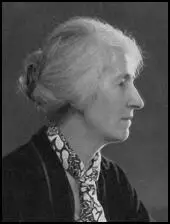
Ada Brown was born in Raunds, Northamptonshire on 20th July, 1866. As a young woman she joined the West London Mission. As a friend later argued, "her motive was religious, but she had soon added a social purpose to it."
In 1897 she transferred to the Bermondsey Settlement where she was the leader of the Mothers' Meeting and had responsibility for the Girls' Club. Fenner Brockway, a journalist who was one of the leaders of the Independent Labour Party (ILP), has pointed out: "The girls were rag-sorters, wood-choppers, tin-smiths, rough and tough, sometimes reacting against the drabness of their existence by indulging in wild excesses, sometimes arriving drunk at the Club. Ada Brown's gracious personality had a remarkable effect upon many of these girls: they came under its influence, their characters began to change and, despite their surroundings, a gentleness and love of beauty came into their lives."
While working at the settlement she met and fell in love with Alfred Salter, who was a student at Guy's Hospital. He converted her to socialism and she encouraged him to become a Christian. They both joined the Peckham branch of the Society of Friends. They both decided they should dedicate their lives to helping the poor. On 6th July 1899 Alfred wrote to Ada: "I have been paying numerous visits to derelict families all the afternoon and evening. Several of the homes I have just been into have made me feel aghast at my helplessness and powerlessness to lift their occupants out of their existing poverty and squalor. Oh, the cruelty and wickedness of our society today! - to thrust down these people by means of low wages and chronic unemployment into hopeless despair, and then to leave them in that condition with no organised or conscious effort to rehabilitate them.... You and I feel that we have the same mission in life and the same consciousness of the ends, objects and consequences of that mission. We are living and working for the same goal - to make the world, and in particular, this corner of the world, happier and holier for our joint lives."
Alfred and Ada Salter decided to devote their lives to the people of Bermondsey and he established a general medical practice in the area. Salter rented out a shop on Jamaica Road and turned it into a surgery. They were married at Raunds on 22nd August 1900. Fenner Brockway has argued: "In Jamaica Road they began the partnership which was to bring something little short of a revolution to Bermondsey and its people."
Salter's takings during the first week amounted to 12s. 6d. As one source points out: "This did not last long, however; within a few weeks his problem became too many clients. It was not only his low charges which attracted patients: it was the treatment he gave and the way in which he gave it, it was the energy with which he insisted on beds in hospitals for urgent cases." Salter was so successful that he soon needed to recruit four other doctors to the surgery. They were chosen because they shared his basic values of Christian Socialism. Salter ran the surgery as a local cooperative and the five doctors shared their takings equally.
Ada Salter was active in the Liberal Party. She also joined the Rotherhithe Women's Association and became its president. On 5th June, 1902, Ada gave birth to Joyce. Four years later they rented out a house in Storks Road. According to Fenner Brockway it "was a grimy three-storied building, with a basement and yard, overhung by a large factory." A friend, Albert Dawson, wrote: "Dr. Salter is not a reposeful man; he is too high-spirited and vigorous, and lives at the top of his form, but the gentle sweetness and serenity of Mrs. Salter balance her husband's energy and strength."
Ada and Alfred Salter gradually grew disillusioned with the Liberal Party's lack of radicalism and in May 1908 they joined the Independent Labour Party (ILP).This was partly because of the leadership of James Keir Hardie and his policies of "the school-feeding of hungry children, for old-age pensions, for the maintenance of the unemployed." They joined with twelve friends to establish a ILP branch in Bermondsey.
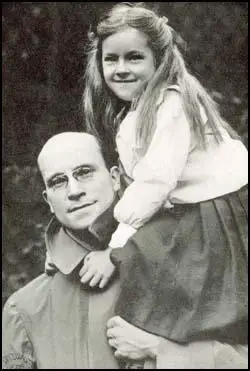
In June 1910, Ada's daughter, Joyce, caught scarlet fever. She became seriously ill and was admitted to the South-Western Fever Hospital. Joyce was adored in Bermondsey, everyone calling her "our little ray of sunshine". There were so many enquiries that bulletins had to be placed at regular intervals on the front door of their home. Unfortunately she died and according to their friend, Fenner Brockway: "It needed all their faith to live through this test. Ada's sadness never quite left her; it was in her eyes and in her expression all through the years. Alfred changed from the boisterously cheerful crusader to a man who seemed constantly in the presence of sorrow: months passed before he smiled and it was years before the gay, bubbling laughter returned. Joyce's portrait, on the mantelpiece in his study, was decorated by Ada with flowers or ivy every day: right to the end of their working lives this practice was observed. The sense of loss was intensified as the years passed by the disappointment that Joyce remained their only child."
In November 1910, the Independent Labour Party nominated seven candidates for the Borough Council elections. However, only one, Ada Salter, was elected. She therefore became the first woman councillor in London. That night the ILP had a party in Bermondsey where they discussed their plans for the future. Alfred Salter said: "We'll pull down three-quarters of Bermondsey and build a garden city in its place."
The Bermondsey ILP arranged for a series of Thursday evening lectures. This included visits by Margaret MacMillan, Bruce Glasier, Katherine Glasier, Charlotte Despard, G. D. H. Cole, Clement Attlee, Herbert Morrison, Jessie Stephen, George Lansbury, William Anderson and H. H. Slesser.
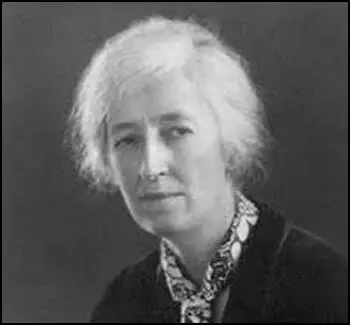
Ada Salter was active in the campaign for women's suffrage. In 1906 Ada Salter helped to establish the Women's Labour League which was established to encourage women to become involved in the Labour Party and to seek improvements in the work and family lives of working-class women. Other members included Margaret MacDonald, Margaret Bondfield, Katherine Glasier, Charlotte Despard, Mary Gawthorpe, Mary Macarthur and Marion Phillips. Ada supported the non-violent Women's Freedom League as she rejected the tactics of the Women Social & Political Union.
Ada Salter remained active in the ILP and in 1913 was re-elected to the Bermondsey County Council. However, Alfred Salter and the other 13 ILP candidates were defeated. Ada campaigned to convert Bermondsey into a Garden City. On her initiative a Beautification Committee was appointed.
In the 1922 General Election Ada's husband, Alfred Salter, was elected to represent Bermondsey West in the House of Commons. The Labour Party also had the largest number of seats on the Bermondsey Borough. Ada now became London's first Mayor. As a socialist she declined to wear Mayoral robes or the chain of office.
With a Labour majority on the council, Ada could now push on with her plans to improve the look of Bermondsey. A Borough Gardens Superintendent was employed and ordered to plant elms, populars, planes and acacias in the streets of Bermondsey. Later he added birch, ash, yew and wild cherry.
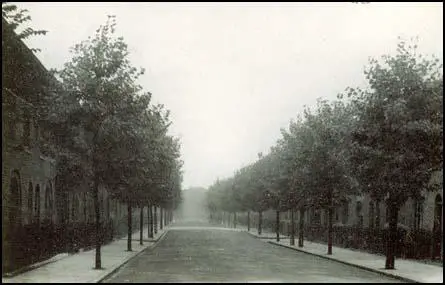
The new Labour council also launched a campaign to improve public health in Bermondsey. Special films were prepared and were shown to large crowds in the open air and pamphlets were distributed throughout the borough. A systematic house-to-house inspection was conducted to seek out conditions dangerous to health. Premises where food was sold were constantly examined and samples of foods were taken away for analysis.
The people of Bermondsey welcomed the actions taken by the local council. In the 1925 elections, it established a national record when every seat on the Borough Council and the Board of Guardians returned Labour members. The parliamentary seat and the two London County Council seats were also held by the party.
When the Labour Party took office in 1922 the death-rate was 16.7 per 1,000. By 1927 it had fallen to 12.9. In 1922 the number of new cases of tuberculosis was 413. In 1927 it was 294. Deaths from the disease fell from 206 to 175. Alfred Salter claimed " Though Bermondsey is an overcrowded industrial area, with few amenities and a poor population living under great residential and economic disadvantages, yet if the death rate continues to diminish at the present rate, the borough will be entitled in a few years to be regarded as one of Britain's health resorts. Day in, day out, year in, year out, this wonderful preventive work, scientifically organised and directed by trained brains, is going on like clockwork. The Labour majority in the Council intend to employ any and every means to stamp out preventable illness."
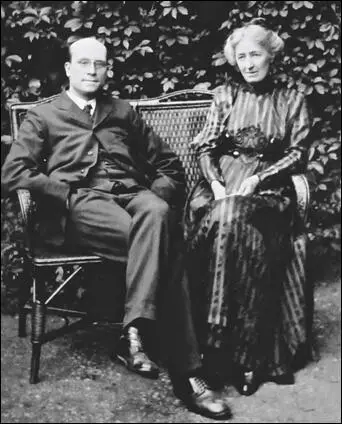
Alfred Salter resigned from Bermondsey Borough Council in 1931, but she remained and continued her struggle to turn Bermondsey into a Garden City. The journalist, Fenner Brockway, wrote about the progress that had been made by 1937: "By this time Bermondsey's trees and flowers were famous. Travelling on the Southern Railway by the long viaduct which crosses the borough passengers noted with wonder the avenues of green between the crowded buildings, the beds of tulips or dahlias in the gaps between the houses, the climbing roses on the balconies of the tenements. Films of the streets, gardens and churchyards were shown all over the world and some American visitors included them with Westminster Abbey and the Tower of London in the sights of London." An article in The Observer commented that "outside the Royal Parks it would be, difficult to find anywhere such masses of colour."
In 1937 Ada Salter and her close friend, Eveline Lowe, were once again elected to both the London County Council and the Bermondsey Borough Council. Every seat was won by the Labour Party and after the elections the Conservative Party Association closed its offices in Bermondsey.
Ada gave an interview to The Evening News in July, 1939, about her marriage and political work. "I don't know anything about medicine and I've never thought of standing for Parliament, but then he doesn't garden, to even things up. One thing we don't share is a study. He has such a stock of books and papers that when I have letters to write I borrow his secretary's room... I don't know what it would be like to have two politicians in the home who take opposite views, but we two, who have the same opinions, but different fields of administration, find it very satisfactory indeed."
Ada Salter died on 4th December, 1942. Alfred Salter wrote a month later: "The loneliness grows deeper and has not lessened in the slightest with the lapse of time. Sometimes it is almost unbearable, but I have to learn to bear it."
Primary Sources
(1) Fenner Brockway, Bermondsey Story: The Life of Alfred Salter (1949)
Shortly after joining the Settlement, Salter heard of a young woman on the staff who, in order to identify herself completely with the people of Bermondsey, was living in a working-class tenement nearby. This struck his imagination and he took the first opportunity to meet her. Ada Brown had come from a comfortable home in Raunds, Northamptonshire, to join the West London Mission: her motive was religious, but she had soon added a social purpose to it. In 1897 she transferred to Bermondsey Settlement, taking charge of the Girls' Club. The girls were rag-sorters, wood-choppers, tin-smiths, rough and tough, sometimes reacting against the drabness of their existence by indulging in wild excesses, sometimes arriving drunk at the Club. Ada Brown's gracious personality had a remarkable effect upon many of these girls: they came under its influence, their characters began to change and, despite their surroundings, a gentleness and love of beauty came into their lives. Ada was five years Alfred's senior; but he fell in love with her. She had a sweetness, a serenity, and a selflessness which won him completely. The engagement of the Settlement firebrand, agnostic and revolutionist, and this quiet devoted Christian worker caused somewhat of a sensation; but Ada claimed that Alfred, with his moral uprightness, his zeal for temperance, his devotion to social service, his ideals of a nobler society and of peace, was a better Christian than many who avowed Christianity. She often smiled, almost in a maternal way, at his extravagances, but she rapidly developed an enthusiasm for the political, social and economic changes which were so important to him.
She shared also his love of the country. She often thought back to the pleasant farms and park-lands of Northamptonshire, to the fifteenth-century house which was her home, and to the trees and the lowing herds. Walking the fields and woods of Kent with Alfred, she renewed the inspiration which she had drawn from Nature in her girlhood days. She had intended to leave Bermondsey Settlement to become housekeeper to her brother, a Wesleyan minister, the year before Alfred Salter came; in her simple Christian faith she had no doubt that divine destiny had held her there.
(2) Alfred Salter, letter to Ada Brown (22nd April, 1899)
I have no lingering hankering after the fleshpots of Sudbury or Guy's or Harley Street, but I have sometimes hesitated a little - perhaps I ought to say quailed - before the dull, interminable, leisureless grind, the weary monotonous treadmill of work, that so certainly awaits me if I am to practise down here amongst the working people, and if I am to do so honourably and honestly and do my practice for other ends than money-getting... But it must be done, and the greatness of the task demands a proportionately great effort on my part. I think that the quality I admire most is fearlessness, and, in spite of haunting fears, I believe I have enough in my composition to dare to take up what I know is my divine vocation in a bold, confident, yes, and a defiant spirit. But I shall sorely need your help, your love, your support and your consolation. Without it life would be without flavour, future without hope, strife without encouragement. And yet it has been dawning on me recently that I have no right to ask you to share such risks, risks that may make you suffer. Anyhow, I have no business to go further without laying before you the fullest possible consequences of joining your life to mine and of throwing in your lot with me.
(3) Alfred Salter, letter to Ada Brown (23rd June, 1899)
I am certain that the purpose which has delivered me from a life of restless ambition and self-aggrandisement, which is shaping my ends independently of my inclinations, and which sent me down to live and work in Bermondsey - that Purpose and that Will has given us to each other as surely as it prevented you from leaving Bermondsey last year. We are to be given over to the service of Bermondsey, to be her faithful servants, to live for her, if need be to give our lives for her.
(4) Alfred Salter, letter to Ada Brown (5th July, 1899)
For one moment, and one moment only," he wrote a fortnight later, "I have felt that I would like to take you away, right away, out of all this smoke and grime and squalor, and set you down in the midst of idyllic rusticity and rural serenity. But I know that neither of us would be happy away from the calls of duty and service to our fellows... If we can manage to go periodically to the very bosom of Nature and if we listen to her as she sings and preaches to us, we shall go back to darkest Bermondsey all the more capable of spreading and diffusing the glory and sweetness and brightness and joy that we have ourselves experienced. And believe me, we shall serve all the more efficiently and usefully.
(5) Alfred Salter, Six Years of Labour Rule (1928)
A large part of Bermondsey needs pulling down and rebuilding. Thousands of dark, wretched, out-of-date hovels, erected 150 years or 180 years ago, are totally unfit to house a growing family, and ought to be demolished and replaced by well-lighted and well-planned modern cottage homes. Many thousands of people at present live two, three or four families in a house built originally to accommodate one only. There is no real privacy, there is only one W.C., one scullery, one copper, and one water supply between them all....
Though Bermondsey is an overcrowded industrial area, with few amenities and a poor population living under great residential and economic disadvantages, yet if the death rate continues to diminish at the present rate, the borough will be entitled in a few years to be regarded as one of Britain's health resorts. Day in, day out, year in, year out, this wonderful preventive work, scientifically organised and directed by trained brains, is going on like clockwork. The Labour majority in the Council intend to employ any and every means to stamp out preventable illness. They believe with Ruskin that "there is no wealth but life."
(6) Ada Salter, interviewed by The Evening News (25th July, 1939)
I don't know anything about medicine and I've never thought of standing for Parliament, but then he doesn't garden, to even things up. One thing we don't share is a study. He has such a stock of books and papers that when I have letters to write I borrow his secretary's room... I don't know what it would be like to have two politicians in the home who take opposite views, but we two, who have the same opinions, but different fields of administration, find it very satisfactory indeed.

